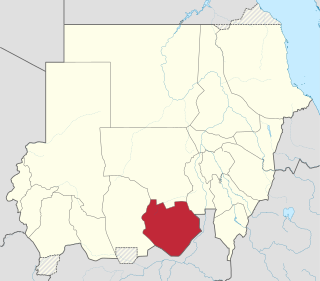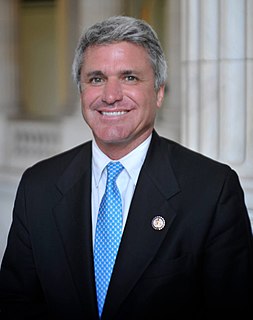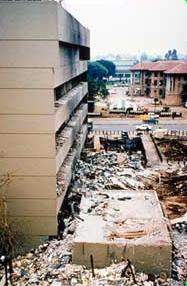Kosti | |
|---|---|
| Coordinates: Coordinates: 12°44′N32°19′E / 12.73°N 32.31°E | |
| Country | Sudan |
| State | White Nile |
Kosti is a district of White Nile state, Sudan. [1] [2]
Kosti | |
|---|---|
| Coordinates: Coordinates: 12°44′N32°19′E / 12.73°N 32.31°E | |
| Country | Sudan |
| State | White Nile |
Kosti is a district of White Nile state, Sudan. [1] [2]

Khartoum or Khartum is the capital of Sudan. With a population of 5,274,321, its metropolitan area is the largest in Sudan. It is located at the confluence of the White Nile, flowing north from Lake Victoria, and the Blue Nile, flowing west from Lake Tana in Ethiopia. The place where the two Niles meet is known as al-Mogran or al-Muqran. From there, the Nile continues north towards Egypt and the Mediterranean Sea.

Sudan, officially the Republic of the Sudan, is a country in Northeast Africa. It shares borders with the Central African Republic to the southwest, Chad to the west, Egypt to the north, Eritrea to the northeast, Ethiopia to the southeast, Libya to the northwest, South Sudan to the south and the Red Sea. It has a population of 45.70 million people as of 2022 and occupies 1,886,068 square kilometres, making it Africa's third-largest country by area, and the third-largest by area in the Arab League. It was the largest country by area in Africa and the Arab League until the secession of South Sudan in 2011, since which both titles have been held by Algeria. Its capital is Khartoum and its most populated city is Omdurman.

Omar Hassan Ahmad al-Bashir, also known as Johnny Bashir, is a Sudanese former military officer and politician who served as the seventh head of state of Sudan under various titles from 1989 until 2019, when he was deposed in a coup d'état. He was subsequently incarcerated, tried and convicted on multiple corruption charges. He came to power in 1989 when, as a brigadier general in the Sudanese Army, he led a group of officers in a military coup that ousted the democratically elected government of prime minister Sadiq al-Mahdi after it began negotiations with rebels in the south. He was elected three times as president in elections that have been under scrutiny for electoral fraud. In 1992, al-Bashir founded the National Congress Party, which remained the dominant political party in the country until 2019. In March 2009, al-Bashir became the first sitting head of state to be indicted by the International Criminal Court (ICC), for allegedly directing a campaign of mass killing, rape, and pillage against civilians in Darfur. On 11 February 2020, the Sudanese government announced that it had agreed to hand over al-Bashir to the ICC for trial.

South Kordofan is one of the 18 wilayat or states of Sudan. It has an area of 158,355 km² and an estimated population of approximately 1,100,000 people (2000). Kaduqli is the capital of the state. It is centered on the Nuba Hills. At one time it was supposed that South Kordofan was the only state in (North) Sudan suitable for producing oil, but oil has also been discovered in neighboring White Nile State in larger quantities.

Michael Thomas McCaul Sr. is an American attorney and politician serving as the U.S. representative for Texas's 10th congressional district since 2005. A member of the Republican Party, he chaired the House Committee on Homeland Security during the 113th, 114th, and 115th Congresses. His district stretches from Austin to Houston.

Atbara is a city located in River Nile State in northeastern Sudan.

The War in Darfur, also nicknamed the Land Cruiser War, is a major armed conflict in the Darfur region of Sudan that began in February 2003 when the Sudan Liberation Movement (SLM) and the Justice and Equality Movement (JEM) rebel groups began fighting against the government of Sudan, which they accused of oppressing Darfur's non-Arab population. The government responded to attacks by carrying out a campaign of ethnic cleansing against Darfur's non-Arabs. This resulted in the death of hundreds of thousands of civilians and the indictment of Sudan's president, Omar al-Bashir, for genocide, war crimes, and crimes against humanity by the International Criminal Court.

The 1998 United States embassy bombings were attacks that occurred on August 7, 1998. More than 200 people were killed in nearly simultaneous truck bomb explosions in two East African cities, one at the United States Embassy in Dar es Salaam, Tanzania, the other at the United States Embassy in Nairobi, Kenya.

The African Union-United Nations Hybrid Operation in Darfur is a joint African Union (AU) and United Nations (UN) peacekeeping mission formally approved by United Nations Security Council Resolution 1769 on 31 July 2007, to bring stability to the war-torn Darfur region of Sudan while peace talks on a final settlement continue.

The South Sudan People's Defence Forces (SSPDF), formerly the Sudan People's Liberation Army (SPLA), is the army of the Republic of South Sudan. The SPLA was founded as a guerrilla movement against the government of Sudan in 1983 and was a key participant of the Second Sudanese Civil War, led by John Garang. After Garang's death in 2005, Salva Kiir was named the SPLA's new Commander-in-Chief. As of 2010, the SPLA was divided into divisions of 10,000–14,000 soldiers.

The Arab League has 22 member states. It was founded in Cairo in March 1945 with six members: the Kingdom of Egypt, Kingdom of Iraq, Lebanon, Saudi Arabia, Syrian Republic, and Transjordan. North Yemen joined on 5 May 1945. Membership increased during the second half of the 20th century. Seven countries have observer status. The headquarters are located in Cairo, Egypt.

South Sudan, officially known as the Republic of South Sudan, is a landlocked country in Central Africa. It is bordered by Ethiopia, Sudan, Central African Republic, Democratic Republic of the Congo, Uganda and Kenya. Its population was estimated as 12,778,250 in 2019. Juba is the capital and largest city. The nation is sometimes informally referred to as the Nilotic Republic.
Ethnic violence in South Sudan has a long history among South Sudan's varied ethnic groups. South Sudan has 64 tribes with the largest being the Dinkas, who constitute about 35% of the population and predominate in government. The second largest are the Nuers. Conflict is often aggravated among nomadic groups over the issue of cattle and grazing land and is part of the wider Sudanese nomadic conflicts.

Juba Airport is an airport serving Juba, the capital city of South Sudan. The airport is located 5 km (3 mi) northeast of the city's central business district, on the western banks of the White Nile. The city and airport are located in South Sudan's Central Equatoria State.

The South Sudanese passport is given to citizens of South Sudan for international travel. The Republic of South Sudan started issuing internationally recognised electronic passports in January 2012. The passports were officially launched by President Salva Kiir Mayardit on 3 January 2012 at a ceremony in the capital city of Juba. The new passport will be valid for five years.

The South Sudanese Civil War was a multi-sided civil war in South Sudan between forces of the government and opposition forces. In December 2013, President Kiir accused his former deputy Riek Machar and ten others of attempting a coup d'état. Machar denied trying to start a coup and fled to lead the SPLM – in opposition (SPLM-IO). Fighting broke out between the Sudan People's Liberation Movement (SPLM) and SPLM-IO, igniting the civil war. Ugandan troops were deployed to fight alongside the South Sudanese government. The United Nations has peacekeepers in the country as part of the United Nations Mission in South Sudan (UNMISS).

The Sudanese Revolution was a major shift of political power in Sudan that started with street protests throughout Sudan on 19 December 2018 and continued with sustained civil disobedience for about eight months, during which the 2019 Sudanese coup d'état deposed President Omar al-Bashir on 11 April after thirty years in power, 3 June Khartoum massacre took place under the leadership of the Transitional Military Council (TMC) that replaced al-Bashir, and in July and August 2019 the TMC and the Forces of Freedom and Change alliance (FFC) signed a Political Agreement and a Draft Constitutional Declaration legally defining a planned 39-month phase of transitional state institutions and procedures to return Sudan to a civilian democracy.
Al Fushqa or al-Fashaga is a district of Al Qadarif state, Sudan. The capital is Showak. The district has very fertile agricultural land and forms a disputed region between Ethiopia and Sudan known as the al-Fashaga triangle.
Kabkabiya is a district of North Darfur state, Sudan.